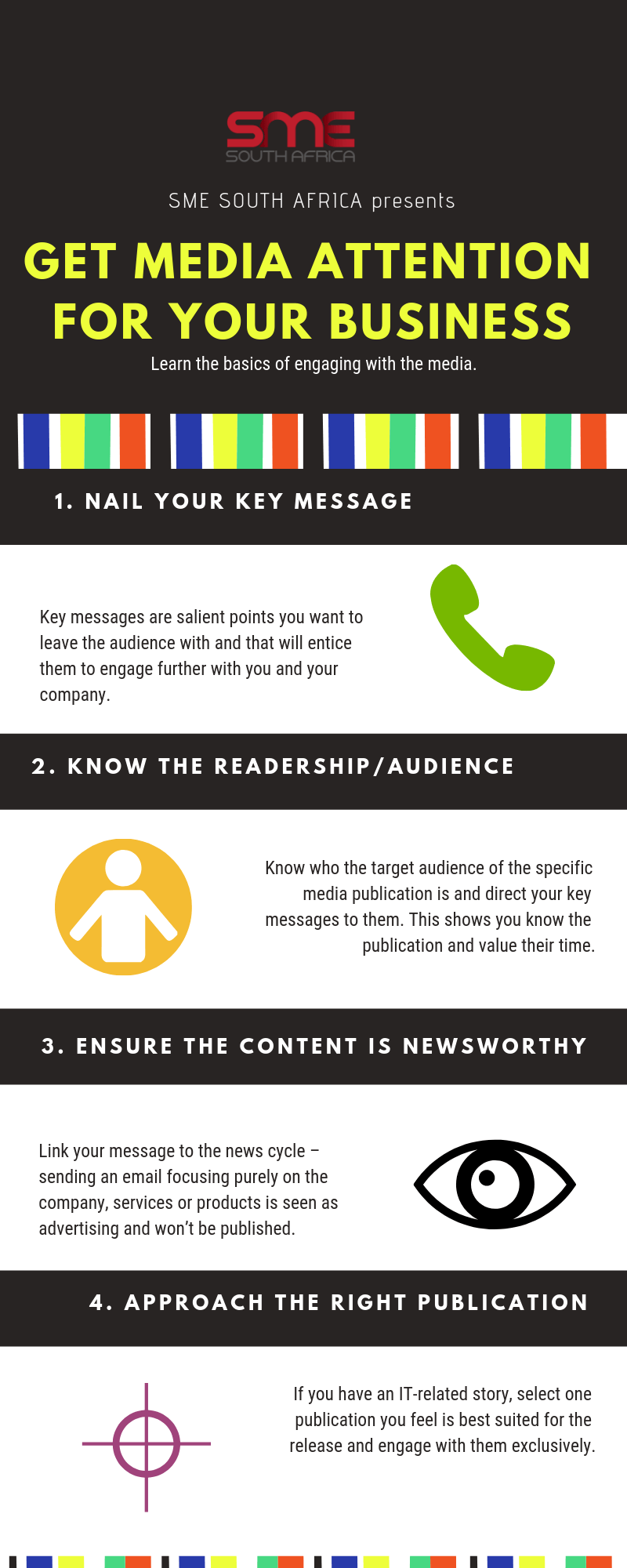
Gaining media coverage for your brand or business can be an effective part of your marketing plan. Reaching a bigger audience not only increases your pool of potential customers and clients, but can lead to greater investor (or partner) interest.
Media attention can also help an entrepreneur to build their personal brand. It is a way to amplify an entrepreneur’s credibility, to show their expertise, which can lead to speaking gigs and even sales.
Many local startups, like media darlings Yoco and Sweepsouth, cleverly utilise media coverage to amplify their messaging and raise awareness around their product or service.
The marketing objective
Lunice Johnston, founder of the public relations company Lunice Johnston Communications, works behind the scenes to secure media coverage for her clients through press releases and interviews.
She says her team’s ultimate goal is to communicate their clients’ business positioning.
Johnston gives a complete guide to getting attention for your business.
On the benefits of media coverage
I believe every small business has an interesting story to tell, but it’s how it’s being told that matters.
Media coverage as part of your marketing plan can help small business owners to:
– position themselves as a thought leader;
– raise awareness for the brand/company;
– stand out from their competitors; and
– build a bank of goodwill.
Media coverage should not be seen as a quick fix to increase sales. Media relations and securing coverage is part of the entire marketing mix. It doesn’t help a small business to receive numerous mentions in the media but their product is not available or the receptionist is rude.
Media training 101
Never engage with the media, especially radio and TV, if you haven’t done some form of media training with reputable trainers.
How to prepare
1. Know what it is that you want to tell the media – what you share should link to the current news cycle. For example, with the National Budget speech being delivered, issue a release stating how you as a small business owner would like to see your specific industry benefit.
2. Develop key messages before any media interview – key messages are salient points you want to leave the audience with and that will entice them to further engage with you and your company.
3. Know who the target audience of the specific media publication is and direct your key messages to them. Don’t send a press release on parenting matters to an IT publication – it shows you don’t know the media and you don’t value their time.
4. Develop stories to give your content a human element i.e. if you’re developing a new app demonstrate it live for the audience and share how it can benefit them.
5. Be selective with which publication you approach. If you have an IT-related story, select one publication you feel is best suited for the release and engage with them exclusively.
How to select a publication or media portal
1. Read daily, weekly and monthly publications to get a feeling for their style, the kinds of stories they publish and who the editor and other journalists are.
2. Listen to the radio station and watch TV – every presenter or anchor has a different style, it’s good to know before an interview what their style is.
3. No company is guaranteed or entitled to space in any kind of media unless they’ve paid for it either through advertising or an advertorial – organisations must work for coverage. Also remember publications want fresh content.
How to contact the media
1. There are many media lists available – I find the Media List very helpful. It is updated quarterly.
2. I would also recommend phoning the different media houses and asking the receptionist for the details of a specific journalist you want to reach.
3. Don’t troll journalists on their social media platforms.
The final word
– Be authentic when you approach the media.
– Ensure your content is newsworthy. Link it to the news cycle. Sending a release which focuses purely on your company, services or product is seen as advertising and won’t be published. Instead, it will only annoy journalists who in future might not use any of your content, no matter how good it is.
– Respect the media – don’t bad mouth them on public platforms and expect them to come to your press conference or publish your articles.
– Don’t miss a deadline and never be late.







